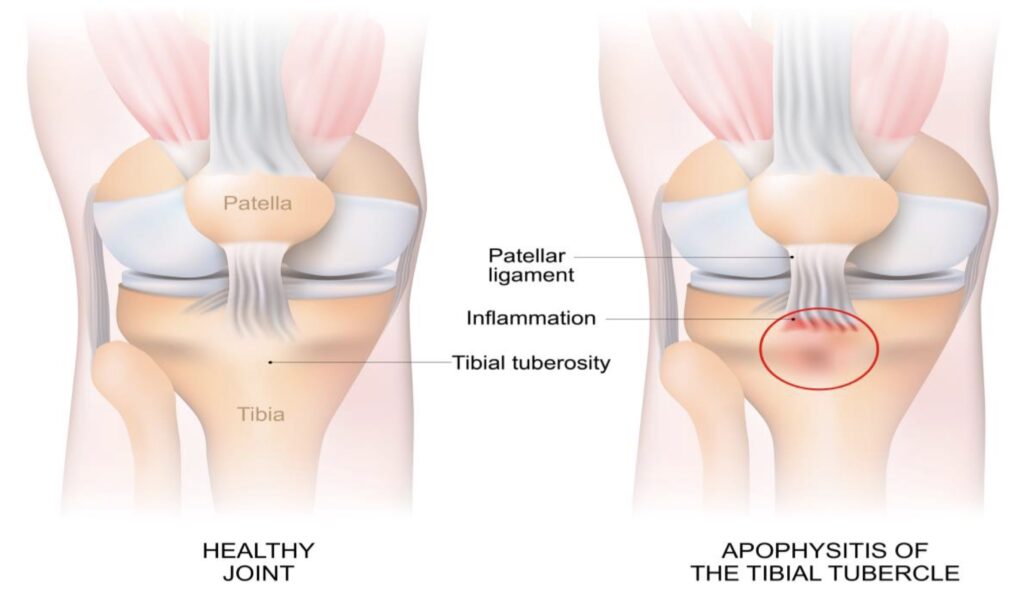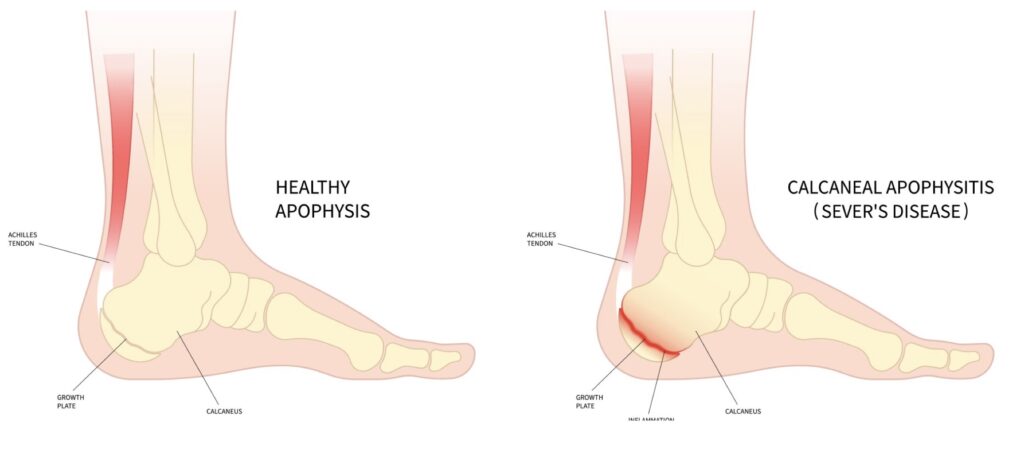Osgood-Schlatter and Sever Disease – Evidence based advice.
By Nick Rowe, Oct 2024
Osgood-Schlatter Disease
Osgood Schlatter Disease (sometimes also called Traction Apophysitis) is a term used to describe pain in the area just below the knee. The pain is due to inflammation of the growth plate at the top of the shinbone (tibia), where the patellar tendon (the tendon that connects the kneecap to the shinbone) attaches.
Both Osgood-Schlatter Disease and Sever’s disease are caused by repetitive stress on the growth plate during growth spurts. As bones grow faster than muscles and tendons, the muscles and tendons can become tight and pull on the growth plates, causing inflammation and pain.
It is important to note that pain in this area is not dangerous and is a normal overprotective response by the body.
It is estimated that 1 in 10 young people aged 10-15years old will be affected by it, and it is generally the young active athlete, especially boys aged 10 to 15, who participate in sports that involve a lot of running and jumping, such as football, basketball, and athletics.
COMMON SYMPTOMS OF OSGOOD-SCHLATTER DISEASE
Pain and tenderness below the kneecap, often worse with activity and relieved with rest.
Swelling just below the kneecap, this can result in a hard lump.
The pain may worsen during and after sport, often coinciding with, or just after a growth spurt. Commonly only one knee will be affected, but sometime both will be.
In the absence of trauma to the knee imaging (Xrays, Ultrasounds, MRI’s are not required).

management
Using an ice-pack during flare ups
Painkillers (as advised by your Doctor or Pharmacist)
Stretching and strengthening exercises
Activity volume/type may need to be reduced
Taking Vitamin D is recommended by the Public Heath England and the World Health Organisation for bone health when growing.
Will it get better?
The Symptoms of Osgood Schlatter’s Disease and Sever’s Disease can last for 12-24months. There may be flare ups where levels of activity needs to be reduced, but the positive thing is sport or physical activity is not likely to cause permanent issue or problems.
Sever Disease
Sever’s disease (sometimes called Calcaneal Apophysitis is an inflammation of the growth plate in the heel where the Achilles tendon (the tendon that connects the calf muscles to the heel bone) attaches. It’s most common in active children aged 8 to 14 year old participating in sports that involve a lot of running and jumping.

Common causes of Sever Disease
More common in boys
High impact activities such as football, basketball and athletics
Tight muscles in the childs calf
Weak muscles to the front of the shin
High BMI / overweight
Sever’s can occur alongside other foot postures such as Pes Planus (flat feet), Pes Cavus (high arches) or Genu Varum (bowed legs).
COMMON symptoms OF SEVER DISEASE
One or both feet can be affected
Can occur alongside, or just after a growth spurt
Pain is better in the morning and after rest, worse with activity
Pain can cause limping and ‘toe walking’
Tenderness to the heel area
Tightening of the calf muscles
Sever’s can usually be diagnosed with physical assessment, Imaging (Xrays, MRI, Ultrasound Scans) are rarely required, unless there are concerns about other conditions.
Management
Using an ice-pack during flare ups
Painkillers (as advised by your Doctor or Pharmacist)
Stretching and strengthening exercises
Activity volume/type may need to be reduced
Taking Vitamin D is recommended by the Public Heath England and the World Health Organisation for bone health when growing.
Wearing supportive / cushioned footwear. Or possibly a gel heel cup / pad.
The role of physiotherapy in the management r disea
THE ROLE OF PHYSIOTHERAPY IN THE MANAGEMENT OF OSGOOD AND SEVER DISEASE
Physiotherapy can play a significant role in managing these conditions and helping young children stay active. Physiotherapy treatment may include the following:
Activity modification – A Physiotherapist can assess the young athlete’s training regimen and recommend modifications to reduce stress on the affected area. This might involve reducing training intensity, duration or switching to low-impact activities for a set timeframe.
Strengthening exercises – Strengthening exercises for the surrounding muscles improves stability and support for the growth plate, reducing pain and the risk of further injury.
Soft tissue release – Stretching the muscle/tendon can be aggravating during an acute flare up, however soft tissue massage / self-massage / foam rollering can be very beneficial.
Balance and proprioception training – Under the guidance of a Physiotherapist following a programme to improve balance and proprioception (body awareness), which can help prevent falls and further stresses to the affected area.
In most cases, Osgood-Schlatter and Sever’s disease improve within a few weeks/months. However, if symptoms are severe or do not improve with treatment, your Physiotherapist can advise/refer on for further investigations.
Final thoughts
Physiotherapy plays a crucial role in effectively addressing Osgood-Schlatter and Severs disease in growing children.
By focusing on strengthening and stretching exercises, as well as educating patients on proper movement patterns, Physiotherapists can help alleviate pain and improve function in those affected by these conditions.
While rest and proper footwear can help alleviate symptoms, Physiotherapy plays a crucial role in effectively treating these conditions and preventing longer-term complications.
- Both conditions are overuse injuries caused by repetitive stress on the growth plates.
- Osgood-Schlatter affects the knee, causing pain below the kneecap.
- Sever’s disease affects the heel, causing pain at the back of the heel where the Achilles tendon attaches.
- These conditions are self-limiting, meaning they resolve on their own once the growth plate closes (typically around age 15–16).
For further information feel free to get in touch either via email nick@nrphysio.co.uk or by phone 07534261106.
